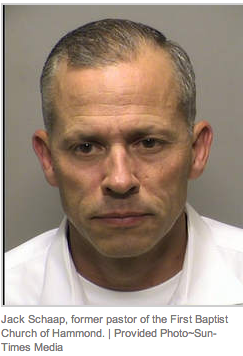"We are constantly getting asked whether we think (the proposed sentence) is fair"
Body
Hammond Baptist hopes former minister’s plea is amen to sex scandal
“We are not trying to determine what is fair. We were just trying to do what was right. Whatever justice is served will be fair because we believe in our justice system.”
Discussion
Hammond, Accountability and Legalism

The pastoral scandal in Hammond has sparked many conversations about why these disasters keep happening, what the phenomenon says about independent fundamental Baptist (IFB) churches and ministies, and what ought to be done to fix whatever exactly is broken. The idea of accountability has figured prominently in several of these conversations.
But if IFB and other branches of Christendom1 are going to use accountability effectively, we’ll have to arrive at a clearer understanding of what accountability is, what it’s limitations are, and where its real value lies. My aim here is to make a small contribution toward that end.
Defining “accountability”
For some, accountability has an almost magical power to keep all bad behavior from happening. Whenever some kind of shocking sin comes to light, their first and last response is “we need more accountability.” In these cases the term “accountability” tends to be defined vaguely if at all. At the other end of the spectrum, some argue that accountability is only something that occurs in response to wrongdoing and that has no power to prevent it (see the conversation here, for example).
Discussion
FBFI Proclaim & Defend: Interview: Voyle A. Glover
Body
Proclaim & Defend: Interview: Voyle A. Glover
I was very sad and remain very, very sad for Jack Schaap, for his wife Cindy, and for his family. This is a catastrophe that is almost unimaginable in terms of the destruction that it will bring within his family, perhaps within the family of God, at least within the walls of first Baptist Church of Hammond Indiana
Discussion
Voyle Glover: "Apparently, they’ve forgotten the lessons of ... the previous pastor"
Body
Pastors who put churches at risk: Jack Schaap and the First Baptist Church
The church has been victimized. But, I suggest that they bear much of the fault … they’ve forgotten the lessons of their rather recent history which involved closed doors and “alone times” with another woman by the previous pastor
Discussion
Voyle Glover's Warning letter to Schaap: "I saw the first Philistine Scout on the beach the other day ... Judgment is on the way, Jack"
Body
Warning Letter in 1993 to Jack Schaap and First Baptist Church of Hammond Indiana
Comment: Glover is the author of Fundamental Seduction: The Jack Hyles Case
Discussion
How Not to Get Your Investigation Taken Seriously: Part 2
Body
How Not to Get Your Investigation Taken Seriously: Part 2
If you are dealing with matters that are potentially criminal, do not make statements such as that you expect no charges to be filed in the matter. You especially do not want to make such statements at the same time that the state and federal authorities are stating that their investigations are continuing.


Discussion